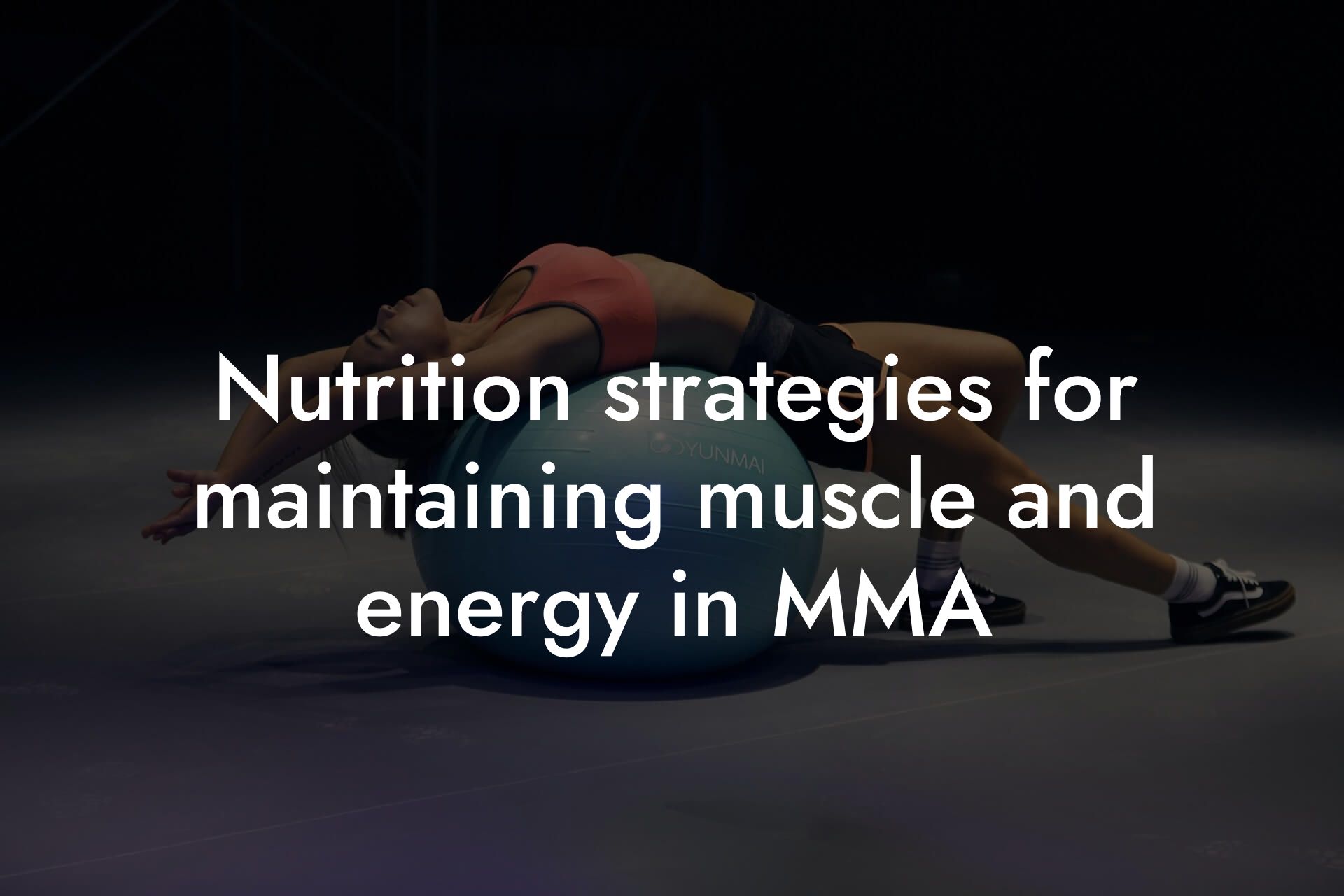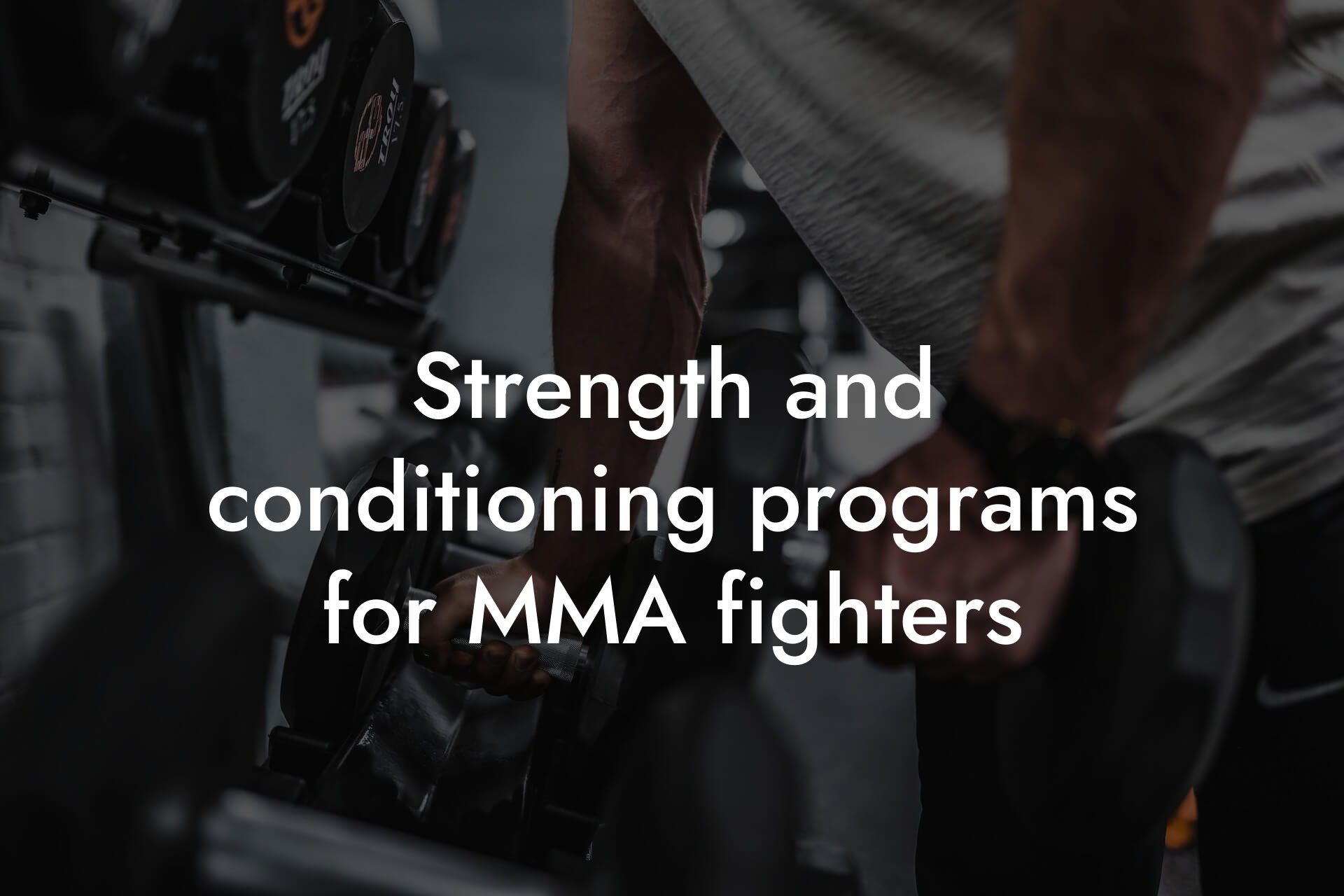As an MMA athlete, you know that the real battle begins after the fight. Recovery is a crucial aspect of your training, and it's essential to have a solid plan in place to ensure you're back to your best in no time. At Tano Performance Group, we understand the importance of optimal recovery for high-earning professionals like yourself, which is why we're sharing our expertise on the best recovery techniques for MMA athletes after fights.
Table of Contents
Immediate Post-Fight Recovery (0-30 minutes)
The first 30 minutes after a fight are critical for recovery. During this time, your body is in a state of shock, and it's essential to take steps to reduce inflammation, replenish energy stores, and prevent further damage. Here are some immediate post-fight recovery techniques to prioritize:
1. Hydrate: Drink 16-20 ounces of water or a sports drink to replenish lost fluids and electrolytes.
2. Stretch and Foam Roll: Gentle stretching and foam rolling can help reduce muscle soreness and improve circulation.
3. Ice Baths: Immersing yourself in an ice bath (50-55°F) for 10-15 minutes can help reduce inflammation and muscle damage.
4. Compression Garments: Wear compression clothing, such as tights or sleeves, to improve circulation and reduce swelling.
Short-Term Recovery (30 minutes-2 hours)
After the initial 30 minutes, your focus should shift to replenishing energy stores and reducing muscle damage. Here are some short-term recovery techniques to incorporate:
1. Protein Shake: Consume a protein shake with 20-30 grams of protein to help repair and rebuild muscle tissue.
2. Carbohydrate Replenishment: Eat a balanced meal or snack that includes complex carbohydrates, such as whole grains, fruits, and vegetables, to replenish energy stores.
3. Anti-Inflammatory Nutrition: Consume foods rich in antioxidants, such as berries, nuts, and leafy greens, to reduce inflammation.
4. Massage Therapy: Receive a gentle massage to promote circulation, reduce muscle tension, and enhance recovery.
Medium-Term Recovery (2-48 hours)
During this phase, your focus should shift to promoting tissue repair, reducing muscle soreness, and improving functional movement. Here are some medium-term recovery techniques to incorporate:
1. Active Recovery: Engage in low-intensity aerobic activities, such as cycling or swimming, to promote circulation and reduce muscle stiffness.
2. Contrast Showers: Alternate between hot and cold water in the shower to reduce inflammation and improve circulation.
3. Self-Myofascial Release: Use tools like lacrosse balls or tennis balls to release tension in your muscles and improve range of motion.
4. Sleep and Relaxation: Prioritize 7-9 hours of sleep and engage in relaxation techniques, such as meditation or deep breathing, to reduce stress and promote recovery.
Long-Term Recovery (48 hours-1 week)
During this phase, your focus should shift to rebuilding strength, improving flexibility, and enhancing overall functional movement. Here are some long-term recovery techniques to incorporate:
1. Strength Training: Engage in strength training exercises to rebuild muscle tissue and improve overall strength.
2. Flexibility and Mobility: Incorporate stretching and mobility exercises to improve range of motion and reduce muscle stiffness.
3. Cardiovascular Training: Engage in low-to-moderate intensity cardiovascular exercises, such as jogging or cycling, to improve cardiovascular fitness.
4. Nutrition and Supplementation: Focus on consuming a balanced diet that includes protein, complex carbohydrates, and healthy fats, and consider adding supplements like omega-3 fatty acids and vitamin D to support recovery.
DEXA Scan Analysis for MMA Athletes
At Tano Performance Group, we understand the importance of accurate body composition analysis for MMA athletes. Our DEXA scan technology provides a comprehensive assessment of body fat percentage, lean mass, bone density, and more. By analyzing your DEXA scan results, our experts can help you:
1. Identify areas for improvement in your training and nutrition.
2. Develop a personalized training and nutrition plan tailored to your specific needs.
3. Monitor progress and adjust your plan as needed.
Common Recovery Mistakes to Avoid
While recovery is essential for MMA athletes, there are common mistakes to avoid that can hinder progress and increase the risk of injury. Here are some common recovery mistakes to avoid:
1. Insufficient Hydration: Failing to replenish lost fluids and electrolytes can lead to dehydration, fatigue, and decreased performance.
2. Inadequate Nutrition: Consuming a diet that is inadequate in protein, complex carbohydrates, and healthy fats can impede recovery and hinder progress.
3. Overtraining: Failing to allow for adequate recovery time can lead to overtraining, injury, and decreased performance.
4. Ignoring Sleep and Relaxation: Failing to prioritize sleep and relaxation can lead to chronic stress, fatigue, and decreased performance.
Recovery is a critical aspect of MMA training, and it's essential to have a solid plan in place to ensure you're back to your best in no time. By incorporating the recovery techniques outlined above, you can reduce muscle soreness, improve functional movement, and enhance overall performance. Remember to prioritize hydration, nutrition, sleep, and relaxation, and avoid common recovery mistakes that can hinder progress. At Tano Performance Group, we're committed to helping high-earning professionals like yourself achieve optimal physical performance and body composition. Contact us today to learn more about our DEXA scan technology and personalized training and nutrition plans.
Final Thoughts
Recovery is not a one-size-fits-all approach. It's essential to experiment and find what works best for you. Be patient, stay consistent, and prioritize your recovery. Remember, the best way to win a fight is to be prepared, and recovery is a critical aspect of that preparation. By incorporating the techniques outlined above, you'll be well on your way to optimal recovery and peak performance.
Frequently Asked Questions
What is the importance of recovery techniques for MMA athletes after fights?
Recovery techniques are crucial for MMA athletes after fights as they help to reduce muscle soreness, inflammation, and fatigue. Proper recovery enables athletes to return to training sooner, reduces the risk of injury, and optimizes performance in subsequent fights.
What are some common recovery techniques used by MMA athletes?
Common recovery techniques used by MMA athletes include stretching, foam rolling, massage, cryotherapy, compression garments, and active recovery techniques such as light cardio and strength training.
How soon should MMA athletes start their recovery process after a fight?
Ideal recovery starts within 30-60 minutes after the fight, when the athlete is still in a state of elevated heart rate and blood flow. This allows for optimal removal of waste products and reduction of inflammation.
What is the role of nutrition in the recovery process for MMA athletes?
Nutrition plays a critical role in the recovery process, as it provides the necessary building blocks for muscle repair and replenishes energy stores. A post-fight meal or snack should include a mix of carbohydrates and protein to aid in recovery.
How does cryotherapy aid in recovery for MMA athletes?
Cryotherapy, such as ice baths or cold water immersion, helps to reduce inflammation, muscle soreness, and improve recovery by constricting blood vessels and reducing metabolic rate.
What is the importance of hydration in the recovery process for MMA athletes?
Hydration is essential for recovery, as it helps to replenish lost fluids, electrolytes, and plasma volume. Adequate hydration also aids in the removal of waste products and reduces muscle soreness.
Can MMA athletes use compression garments to aid in recovery?
Yes, compression garments can aid in recovery by improving blood flow, reducing muscle soreness, and enhancing the removal of waste products. They can be worn during and after exercise, as well as during daily activities.
How does massage therapy aid in recovery for MMA athletes?
Massage therapy helps to promote blood flow, reduce muscle tension, and break down adhesions and scar tissue. It can also aid in the removal of waste products and reduce muscle soreness.
What is active recovery, and how does it aid in the recovery process for MMA athletes?
Active recovery involves performing low-intensity exercise, such as light cardio or strength training, to promote blood flow and aid in the removal of waste products. It helps to reduce muscle soreness and improve recovery.
How long does it take for MMA athletes to fully recover from a fight?
The recovery time for MMA athletes can vary depending on the intensity and duration of the fight, as well as the individual's training and recovery habits. On average, it can take 7-14 days for athletes to fully recover.
What are some common mistakes MMA athletes make during the recovery process?
Common mistakes include not starting the recovery process soon enough, not prioritizing nutrition and hydration, and returning to intense training too quickly. These mistakes can lead to prolonged recovery times, increased risk of injury, and decreased performance.
How can MMA athletes incorporate recovery techniques into their training routine?
Recovery techniques can be incorporated into a training routine by scheduling dedicated recovery days, incorporating active recovery techniques during training, and making nutrition and hydration a priority.
What is the role of sleep in the recovery process for MMA athletes?
Sleep is essential for recovery, as it allows for physical and mental restoration. During sleep, the body repairs and rebuilds tissues, builds bone and muscle, and strengthens the immune system.
How does stress management aid in the recovery process for MMA athletes?
Stress management is critical for recovery, as chronic stress can lead to inflammation, fatigue, and decreased performance. Techniques such as meditation, yoga, and deep breathing can help to manage stress and aid in recovery.
Can MMA athletes use supplements to aid in recovery?
Yes, certain supplements such as protein powder, creatine, and branched-chain amino acids (BCAAs) can aid in recovery by providing essential nutrients and reducing muscle soreness.
What is the importance of mental recovery for MMA athletes?
Mental recovery is essential for MMA athletes, as it allows for emotional and psychological restoration. Techniques such as visualization, meditation, and positive self-talk can aid in mental recovery and improve overall performance.
How can MMA athletes balance recovery with training and competition?
Balance can be achieved by prioritizing recovery, incorporating active recovery techniques into training, and scheduling dedicated recovery days. It's also essential to listen to the body and adjust training and recovery accordingly.
What are some common recovery techniques used by MMA athletes during training camp?
Common recovery techniques used during training camp include stretching, foam rolling, compression garments, and active recovery techniques such as light cardio and strength training.
How does altitude training affect recovery for MMA athletes?
Altitude training can affect recovery by increasing inflammation, muscle soreness, and fatigue. It's essential for athletes to prioritize recovery and incorporate additional recovery techniques during altitude training.
What is the role of a coach or trainer in the recovery process for MMA athletes?
A coach or trainer plays a critical role in the recovery process by designing training programs that incorporate recovery techniques, monitoring athlete fatigue and performance, and providing guidance on nutrition and hydration.
How can MMA athletes track their recovery progress?
Recovery progress can be tracked through metrics such as heart rate variability, sleep quality, and muscle soreness. Athletes can also use subjective measures such as mood, energy levels, and overall feeling of well-being.
What are some common misconceptions about recovery for MMA athletes?
Common misconceptions include the idea that recovery is only necessary after a fight, that intense training is necessary to improve performance, and that recovery techniques are only for elite athletes. In reality, recovery is essential for all athletes, regardless of level or competition.
How does recovery impact long-term athletic development for MMA athletes?
Recovery plays a critical role in long-term athletic development by allowing athletes to train consistently, reduce the risk of injury, and optimize performance over time. Proper recovery enables athletes to reach their full potential and extend their careers.
Here are some related articles you might love...
- Reducing body fat for optimal weight class in MMA
- Nutrition strategies for maintaining muscle and energy in MMA
- Strength and conditioning programs for MMA fighters
- Off-season training and conditioning for MMA fighters
- The role of DEXA scans in MMA training and weight management
- The importance of lean muscle mass in MMA performance
- How body composition affects performance in MMA
- Balancing power, speed, and agility in MMA training
- Bone density and injury prevention in MMA
Zak Faulkner
Zak Faulkner is a leading authority in the realm of physical health and body composition analysis, with over 15 years of experience helping professionals optimise their fitness and well-being. As one the experts behind Tano Performance Group, Zak has dedicated his career to providing in-depth, science-backed insights that empower clients to elevate their physical performance and overall health.
With extensive knowledge of DEXA technology, Zak specializes in delivering comprehensive body assessments that offer precise data on body fat, muscle mass, bone density, and overall physique. His expertise enables individuals to make informed decisions and achieve their fitness goals with accuracy and confidence. Zak’s approach is rooted in a deep understanding of human physiology, combined with a passion for helping clients unlock their full potential through personalised strategies.
Over the years, Zak has earned a reputation for his commitment to excellence, precision, and client-focused service. His guidance is trusted by top professionals who demand the best when it comes to their health. Whether advising on fitness programs, nutritional strategies, or long-term wellness plans, Zak Faulkner’s insights are a valuable resource for anyone serious about taking their health and fitness to the next level.
At Tano Performance Group, Zak continues to lead our Content Team revolutionising how professionals approach their physical health, offering unparalleled expertise that drives real results.




